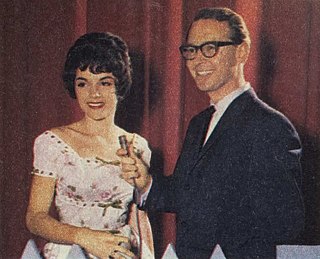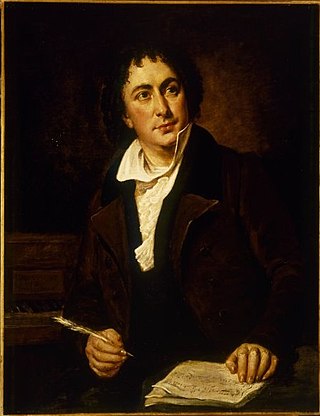Sir Leslie Ronald Young, known professionally as Jimmy Young, was an English singer, disc jockey and radio personality. Early in his career in the 1950s he had two number ones, "Unchained Melody" and "The Man from Laramie", both in 1955, and several other top ten hits in the UK chart, but he became better known for his long-running show on BBC Radio 2, The JY Prog, which ran from 1973 until 2002.

Albert Watson Newton was an Australian media personality. He was a Logie Hall of Fame inductee, quadruple Gold Logie award-winning entertainer, and radio, theatre, and television personality and presenter.

Sir David Valentine Willcocks, was a British choral conductor, organist, composer and music administrator. He was particularly well known for his association with the Choir of King's College, Cambridge, which he directed from 1957 to 1974, making frequent broadcasts and recordings. Several of the descants and carol arrangements he wrote for the annual service of Nine Lessons and Carols were published in the series of books Carols for Choirs which he edited along with Reginald Jacques and John Rutter. He was also director of the Royal College of Music in London.

Cable radio or cable FM is a concept similar to that of cable television, bringing radio broadcasting into homes and businesses via coaxial cable. It is generally used for the same reason as cable TV was in its early days when it was "community antenna television", in order to enhance the quality of over-the-air radio signals that are difficult to receive in an area. However, cable-only radio outlets also exist.
Percy Alfred Scholes PhD OBE was an English musician, journalist and prolific writer, whose best-known achievement was his compilation of the first edition of The Oxford Companion to Music. His 1948 biography The Great Dr Burney was awarded the James Tait Black Memorial Prize.
Stanley Rofe was an Australian rock'n'roll disc jockey and music news reporter.
Norman James Kaye was an Australian actor. He was best known for his roles in the films of director Paul Cox.
A race caller is a public-address announcer or sportscaster who describes the progress of a race, either for on-track or radio and TV fans. They are most prominent in horse racing, auto racing and track-and-field events.

Bandstand is an Australian live pop music, variety television program screened from November 1958 to June 1972. Featuring both local and international music artists, and produced in-house at the studios of the Nine Network in Willoughby, New South Wales, it was originally broadcast only in New South Wales, It became a national program in the early 1960s as the network expanded into other Australian states. The host of Bandstand for its entire existence was radio presenter and television newsreader Brian Henderson.

William Lovelock was an English classical composer and pedagogue who spent many years in Australia. He was the first Director of the Queensland Conservatorium of Music in Brisbane, and later became the chief music critic for The Courier-Mail newspaper while developing an independent career as a composer.
Warren Milton Thomson OAM was an Australian pianist, piano competition juror, music editor, and music educator. He was best known in Australia as artistic director and chairman of the jury of the Sydney International Piano Competition after Rex Hobcroft. He auditioned all entrants, selected the competitors, and chose the repertoire and the other jurors. He was the artistic director of the Yamaha Australian Youth Piano Competition since its inception in 1994.
Michael Brimer was a South African-Australian pianist, organist, conductor, composer, musicologist, and academic.
Ken Sparkes was an Australian radio presenter, television personality, disc jockey and voice-over artist, he also worked as an investigative journalist, sportscaster/commentator and launched briefly a pop career and co-founded his own record label. He was a presenter of radio programs, including presenting the breakfast program on Adelaide's 5KA. His early career was at Melbourne's 3UZ, before launching a career in television in the mid-60's.
Armstrong Studios, also known as Bill Armstrong's Studio and later renamed AAV, is an Australian commercial recording studio located in Melbourne, Victoria. During the decade from 1965 to 1975, Armstrong Studios in South Melbourne was arguably the top independent recording studio in Australasia.
This is a list of events in British radio during 1974.
The Choir of Trinity College, at Trinity College within the University of Melbourne, is a collegiate chapel choir modelled on the choirs at Cambridge and Oxford universities. The choir consists of 27 choral scholars. Under the supervision of the director of music, the choir and organ scholars provide music for regular services of Anglican worship in the college chapel as well as a schedule of public concert performances and recordings for ABC Classics.
Hector William Crawford CBE AO was an Australian entrepreneur, conductor and media mogul, best known for his radio and television production firms. He and his sister Dorothy Crawford founded Crawford Productions, which was responsible for many iconic programs and initiated the careers of a number of notable Australian actors and entertainers. His influence on the Australian entertainment industry was immense and enduring, and one obituary described him as "one of the best-known and most respected names in the history of Australian entertainment".

George William Torrance was an Irish composer, mainly of church music, who was resident in Australia for many years.

The earliest western musical influences in Australia can be traced to two distinct sources: in the first settlements, the large body of convicts, soldiers and sailors who brought the traditional folk music of England, Wales, Scotland and Ireland; and the first free settlers, some of whom had been exposed to the European classical music tradition in their upbringing. An example of original music by a convict would be an 1861 tune dedicated to settler James Gordon by fiddler constable Alexander Laing. Very little music has survived from this early period, although there are samples of music originating from Sydney and Hobart that date back to the early 19th century. Musical publications from this period preserved in Australian libraries include works by Charles Edward Horsley, William Stanley, Isaac Nathan, Charles Sandys Packer, Frederick Augustus Packer, Carl Linger, Francis Hartwell Henslowe, Frederick Ellard, Raimund Pechotsch and Julius Siede.
Wyggeston Grammar School for Boys was a grammar school in Leicester, England, in existence from 1876 to 1976.







